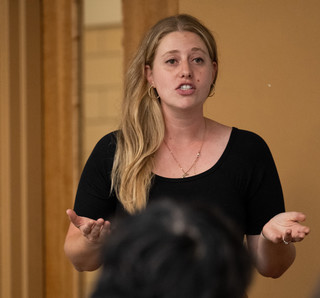Life in the Program
Academic Life
Study
The program requirements translate into a challenging but manageable program of study for students in the program. The typical student completes the program in two years (four semesters). During each semester of the first year, graduate students with a TA normally take three courses and teach one or two sections of Public Speaking. By the end of the first year, students determine their thesis or professional paper project and select a faculty advisor who will guide that project.
During the third semester, students continue with coursework, defend their project proposal, and initiate their research, concluding with a public presentation and defense during their final semester. The Mansfield Library archives student theses and professional papers.
Research
Throughout their career in the program, students have latitude to explore different areas of Communication Studies and engage in research projects with other students and faculty members. Our students regularly present their research at scholarly conferences of the National Communication Association (NCA), Western States Communication Association (WSCA), and Northwest Communication Association (NWCA). The department makes every effort to provide financial and travel support for students to attend these conferences.
Certificate Programs
UM also offers several graduate certificate programs that pair well with our MA degree. Several of our students have pursued programs in Natural Resources Conflict Resolution and Women's, Gender and Sexuality Studies.
Balance
Our department also embraces a work hard, play hard philosophy and is committed to maintaining work-life balance. Graduate students regularly organize department potlucks and picnics, bowling nights, and rafting and hiking adventures.

Life in Missoula
Nestled in the Northern Rockies, Missoula is the nexus of five valleys and three major rivers: the Blackfoot, the Bitterroot and the Clark Fork. With more than 70,000 residents, a major university, and a wide array of cultural, economic, and recreational opportunities, Missoula is a blend of small-town charm and big-city sophistication.
Graduate students find that living in Missoula is a transformative experience. It is a classic college town: a terrific arts and culture scene; a year-round schedule of concerts and shows; all manner of restaurants, breweries, coffeehouses; and close connections between the University and the surrounding area. Missoula is a welcoming, progressive community, an economic hub of Western Montana, and home to a large number of non-profit organizations that offer work and volunteer opportunities for our students.
Missoula's recreational and outdoor opportunities are unrivaled. In addition to walking and biking trails throughout the city, several recreation areas are just minutes from downtown. Hiking, mountain biking, fly fishing, river rafting and skiing are all popular activities here. And, Missoula is a half-day drive from two majestic national parks, Yellowstone and Glacier.
It's no wonder that the book, How to Get an Ivy League Education at a State University called Missoula "a Rocky Mountain Berkeley ... the kind of place many people hate to leave."
For more information, check out Destination Missoula and Make It Missoula.
